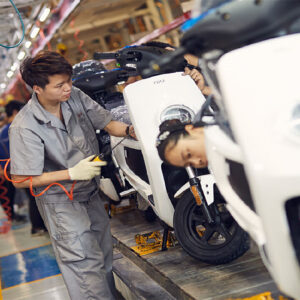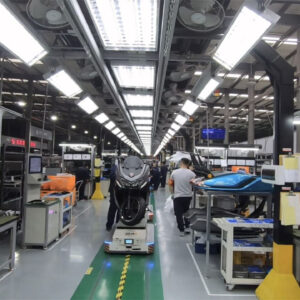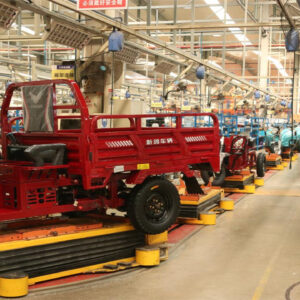Showing 1–16 of 293 results
-

The two-wheeler assembly line mainly includes parts inspection, frame assembly, power system installation, suspension setup, wheel and tire mounting, braking system assembly, electrical system installation, fuel system assembly (for motorcycles), body and cosmetic parts fitting, functional testing, final inspection, and packaging for shipment. These steps ensure a smooth manufacturing process from components to the finished product.
-

The motorcycle assembly line integrates processes for efficient, high-quality production. It includes frame assembly, engine installation, electrical and fuel system setup, suspension and braking system installation, wheel and tire mounting, bodywork fitting, quality inspection, performance testing, and final adjustments. Finished motorcycles are then packaged and shipped. This line emphasizes detail, flexibility, and quality control, with technological advancements enhancing automation and efficiency.
-

AGVs in tricycle assembly lines boost efficiency by automating material transport, reducing manual labor. They offer flexibility, safety, and space optimization. Integrating with MES systems, AGVs provide real-time data for decision-making, enhance load capacity, and cut production costs. They also improve working conditions and shorten production cycles.
-

Technical Specifications Model: S1680x2-60L Power(W): 3000 Cylider(mm): 63.7*13*4 Speed(r.p.m.): 2800 Pressure(Bar): 7.0 Capacity(L/min): 280 Tank(L): 60 N.W.(KG): 41 Overall Dimensions(LxWxH cm): 82*36.5*64
-

Technical Specifications Model: S1680x3-100L Power(W): 4500 Cylider(mm): 63.7*13*6 Speed(r.p.m.): 2800 Pressure(Bar): 7.0 Capacity(L/min): 420 Tank(L): 100 N.W.(KG): 72.5 Overall Dimensions(LxWxH cm): 120*48*83
-

Technical Specifications Model: S1680x4-160L Power(W): 6000 Cylider(mm): 63.7*13*8 Speed(r.p.m.): 2800 Pressure(Bar): 7.0 Capacity(L/min): 560 Tank(L): 160 N.W.(KG): 100.5 Overall Dimensions(LxWxH cm): 144*55*95
-

Technical Specifications Model: 1100 Home Series Power(W): 1100 Cylider(mm): 63.7*20*2 Speed(r.p.m.): 1380 Pressure(Bar): 7.0 Capacity(L/min): 100 Tank(L): 12 N.W.(KG): 25.5 Overall Dimensions(LxWxH cm): 55*42.5*46
-

Technical Specifications Model: 1100-40L Power(W): 1100 Cylider(mm): 63.7*20*2 Speed(r.p.m.): 1380 Pressure(Bar): 7.0 Capacity(L/min): 100 Tank(L): 40 N.W.(KG): 30 Overall Dimensions(LxWxH cm): 70.5*33*67
-

Technical Specifications Model: 1100×2 Power(W): 2200 Cylider(mm): 63.7*20*4 Speed(r.p.m.): 1380 Pressure(Bar): 7.0 Capacity(L/min): 200 Tank(L): 12 N.W.(KG): 44.5 Overall Dimensions(LxWxH cm): 79*42.5*46
-

Technical Specifications Model: 1100×2-60L Power(W): 2200 Cylider(mm): 63.7*20*4 Speed(r.p.m.): 1380 Pressure(Bar): 7.0 Capacity(L/min): 200 Tank(L): 60 N.W.(KG): 51 Overall Dimensions(LxWxH cm): 82*36.5*67
-

Technical Specifications Model: 1100×3-100L Power(W): 3300 Cylider(mm): 63.7*20*6 Speed(r.p.m.): 1380 Pressure(Bar): 7.0 Capacity(L/min): 300 Tank(L): 100 N.W.(KG): 90 Overall Dimensions(LxWxH cm): 120*48*87
-

Technical Specifications Model: 1100×4-160L Power(W): 4400 Cylider(mm): 63.7*20*8 Speed(r.p.m.): 1380 Pressure(Bar): 7.0 Capacity(L/min): 400 Tank(L): 160 N.W.(KG): 116 Overall Dimensions(LxWxH cm): 144*55*99
-

Technical Specifications Model: 1200 Home Series Power(W): 1100 Cylider(mm): 63.7*20*2 Speed(r.p.m.): 1380 Pressure(Bar): 7.0 Capacity(L/min): 100 Tank(L): 12 N.W.(KG): 25.5 Overall Dimensions(LxWxH cm): 55*42.5*46
-

Technical Specifications Model: 1200-40L Power(W): 1100 Cylider(mm): 63.7*20*2 Speed(r.p.m.): 1380 Pressure(Bar): 7.0 Capacity(L/min): 100 Tank(L): 40 N.W.(KG): 30 Overall Dimensions(LxWxH cm): 70.5*33*67
-

Technical Specifications Model: 1200×2 Power(W): 2200 Cylider(mm): 63.7*20*4 Speed(r.p.m.): 1380 Pressure(Bar): 7.0 Capacity(L/min): 200 Tank(L): 12 N.W.(KG): 44.5 Overall Dimensions(LxWxH cm): 79*42.5*46
-

Technical Specifications Model: 1200×2-60L Power(W): 2200 Cylider(mm): 63.7*20*4 Speed(r.p.m.): 1380 Pressure(Bar): 7.0 Capacity(L/min): 200 Tank(L): 60 N.W.(KG): 51 Overall Dimensions(LxWxH cm): 82*36.5*67















